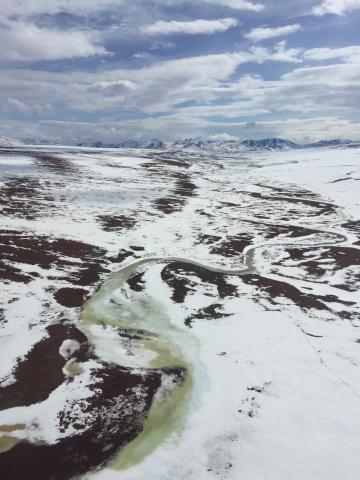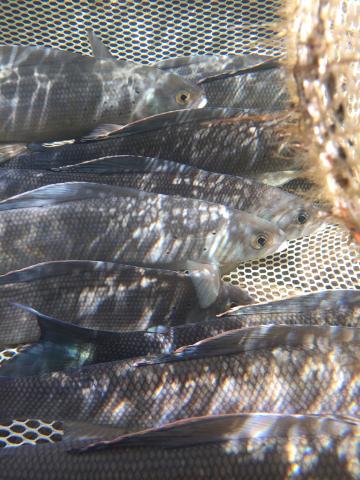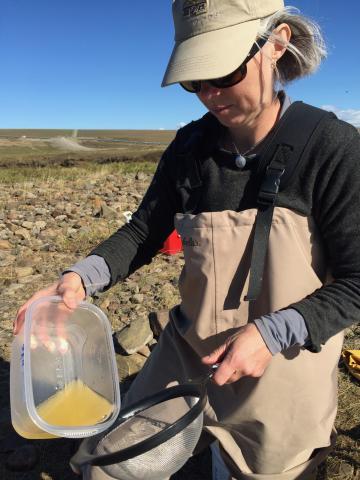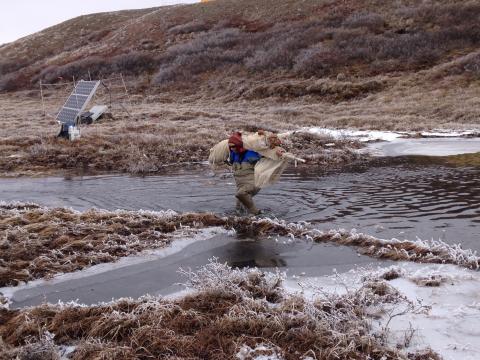Collaborating Investigators:
- Linda A. Deegan, Woods Hole Research Center, Woods Hole, MA
- Mark Urban, Dept. of Ecology and Evolutionary Biology, University of Connecticut, Storrs, CT
- Heidi Golden, Dept. of Ecology and Evolutionary Biology, University of Connecticut, Storrs, CT
- Cam MacKenzie, Atwater Resources, Edmonton, Alberta
Description: Rapidly changing climates uniquely challenge Arctic fish that rely on interconnected, seasonally available habitat. Arctic grayling is a key Arctic species because it is often the only fish species in thousands of miles of streams and because it accumulates energy in those streams that through it's migration provides a trophic subsidy to large piscivorous fish such as Lake trout and char. The Arctic grayling migrates annually between breeding sites in streams and unfrozen overwintering habitat, however, their movement is restricted to a small number of interconnecting waterways. Warmer climates are creating dry streambeds when fish need to migrate to winter habitat and changing when overwintering habitats freeze and thaw. Warmer streams could challenge fish adapted to cooler water. Substantial movement, plasticity, or adaptive genetic variation might allow for resilience to these stressors.
Since 2009, we have been studying populations from three representative Arctic streams that differ in temperature, connectivity, and sensitivity to climate change. Pilot data indicate increasing drying events that threaten the grayling’s return to overwintering sites as well as substantial population structure among and within watersheds. We are quantifying how movement, plasticity, and adaptation mediate the climate responses of Arctic grayling, a keystone species in Arctic streams. We are 1) assaying movement at four time scales ranging from days to centuries; 2) evaluating plasticity and adaptive differentiation among populations; 3) assessing populations for loci under selection; and 4) determining natural selection against grayling subpopulations by integrating data on selected loci with the movement of individually tagged fish.
We will test how watershed characteristics influence movement patterns using individual tagging, otolith micro-chemistry, and genomics. Individual tagging records fine-scale daily movement, otolith micro-chemistry allows the reconstruction of lifetime movement patterns, and genomic data reveals recent and historical movement across the landscape and genes under selection. Lastly, we will quantify genetic and environmental contributions to performance of fish from divergent environments. These key field studies and experiments will inform our understanding of the ecological and evolutionary responses of a key Arctic species to climate change.
For more information see our Blog: https://heidigoldenarcticresearch.wordpress.com/
Funding: From 2009 to 2017, the FISHSCAPE Project has been funded by the National Science Foundation through the Polar Science Program (PLR 1719267, 1417754, and 0902153) and DOI through the NECASC (DOI G12AC00001).
Recent papers:
- Urban, M. C.. "Accelerating extinction risk from climate change," Science, v.348, 2015, p. 571-573.
- Urban, M. C. et al.. "Improving the forecast for biodiversity under climate change," Science, v.353, 2016, p. 1113.
- Nadeau, C. P., Mark C.Urban, and Jon R. Bridle. "Coarse climate change projections for species living in a fine-scaled world," Global Change Biology, 2017.
- Nadeau, C. P., M. C.Urban and Jon R. Bridle. "Climates Past,Present, and Yet-to-Come Shape Climate Change Vulnerabilities," TREE, 2017.
- Urban, M. C., P. L. Zarnetske and D. K. Skelly. "Searching for Biotic Multipliers of Climate Change," Integrative and Comparative Biology, v.57, 2017, p. 134.
- Deegan, L. A., H. Golden, C. MacKenzie, M. Urban, B.J. Peterson. "The importance of Arctic grayling migration as a trophic subsidy to Arctic lake food webs." Ecology.
- MacKenzie,, Deegan, L. A., H. Golden, M. Urban. "The impact of climate change on the migration of Arctic Grayling". In prep.
- Golden, H., K. E. Holsinger, L. A. Deegan, C. J. MacKenzie. "Stream connectivity structures genetic divergence within an Arctic freshwater fish metapopulation." Molecular Ecology.
- . “Climate-Induced Habitat Fragmentation Affects Metapopulation Structure Of Arctic Grayling In Tundra Streams”. Ecology And Evolutionary Biology. Ecology And Evolutionary Biology. University of Connecticut, 2016.





